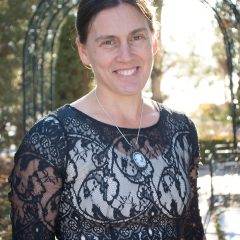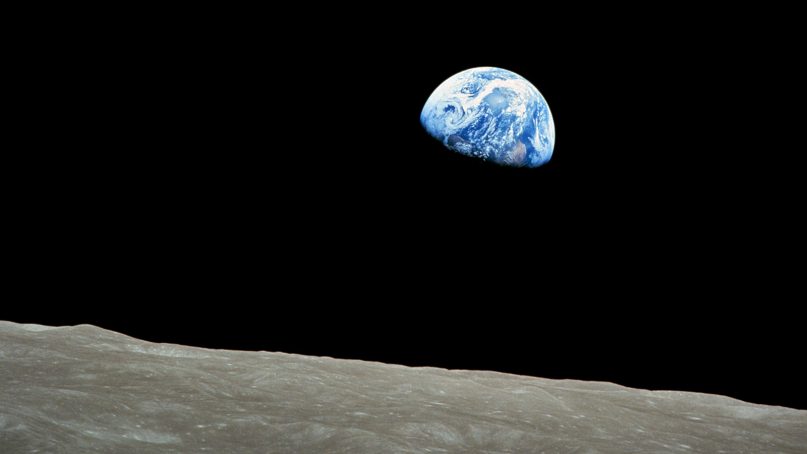A guest post by Mette Harrison
I was arguing recently about politics with a non-Mormon friend who complained that Mormons were anti-science, anti-evolution, anti-vaccination, anti-environment, and a collection of other unfair labels.
I argued back strenuously, saying that I’d always felt that my Mormon religion and family valued education, sometimes to the exclusion of any other achievement. And just because we believe in God doesn’t mean that we can’t also hold other ideas—like evolution and yes, even global warming—in our heads at the same time.
Being Mormon doesn’t mean hiding your head in the sand. In fact, there’s a strong argument to be made that Mormon theology demands a deeply engaged, pro-environment attitude, not only because we believe this earth will eventually become heaven, but also because God has called us to be “stewards” of many of the divine gifts to us, including all the gifts of the earth.
I sent my friend some of the following quotes. In 2017 at the BYU Hawaii Commencement, Elder Dallin H. Oaks said,
“These are challenging times, filled with big worries: wars and rumors of wars, possible epidemics of infectious diseases, droughts, floods, and global warming. Seacoast cities are concerned with the rising level of the ocean, which will bring ocean tides to their doorsteps or over their thresholds. Global warming is also affecting agriculture and wildlife. Nations whose prosperity depends on world peace and free trade worry about disturbing developments that threaten either or both of these.”
He challenged his listeners to consider Sabbath Day observance as a way to fight back against the world. If your first instinct hearing this is to roll your eyes, let me point out that Oaks is making a helpful point about non-consumption and good stewardship. What is typical Mormon Sabbath Day observance like? We attend church—in fact, many of us in Utah are close enough to walk. We don’t spend money, drive to movie theaters, or attend other recreational activities. We don’t go out to restaurants, but tend to eat at home and cook our own food and clean it up ourselves. These are all environmentally friendly ways to live.
Oaks is not the only LDS leader to emphasize caring for the environment. In October 2018, Elder Steven Snow spoke at Utah State University about the importance of focusing our lives on the things that matter, on treating the resources around us with respect, and leaving the natural wonders of our world intact so that future generations can enjoy them:
“Out of necessity my forefathers became stewards of the land they settled. Certain locations were reserved for development, other areas precluded. Agricultural lands, the foundation of the economy, were carefully preserved.”
Then he goes on to say that,
“As Latter-day Saints, we believe that God created this earth to provide a place for the human family to learn, progress, improve, and find joy. [. . .]
God expects every one of His sons and daughters to act as good stewards of the land He created. It causes me much grief when I look outside my window and see a hazy inversion or when I hear consistent reports of Utah’s poor air quality. I am concerned for the families affected by wildfires and for the schoolchildren forced to stay indoors because of smoky skies. Algal blooms are breaking out in Utah’s lakes. We are experiencing unusually dry seasons and record-breaking warm winters.”
The Church has gone to some lengths to make it clear that its official stance is pro-environmental stewardship and conservation. There are suggestions about what local communities can do to support recycling programs and community gardens, and for individuals in personally living a less lavish lifestyle.
Some of those are values I learned from my Mormon parents, even though they annoyed me as a teenager. My mother reuses all of her aluminum foil, which she keeps in a ball. She taught me to keep all of the rubber bands from newspapers, and to recycle the newspapers. She cut up worn-out clothes to use as dish rags and cleaning cloths around the house. She tended to use plain old water and dish soap to clean almost everything. She even cleaned out plastic bags (especially Ziploc bags), which you could see hanging on strings over her sink with clothespins attached.
She also dried clothes naturally instead of in the dryer outside on an old-fashioned clothesline, with more clothespins. She scolded me if I told her I didn’t like certain clothes, telling me they had “good wear” left in them. She also insisted that we at least try on the hand-me-down clothes that were frequently delivered to our doorstep since we were one of the needy families in the ward with eleven children.
Sure, I could chalk this up to her growing up on a farm during the Depression. But there are things we could all learn from her. Reusing possessions, even if they’re things we don’t love, is good for the environment. So is buying items from thrift stores, or even better, taking hand-me-downs in. I also learned from her the time- and money-saving skill of opening the refrigerator, taking stock of what we have, and inventing a recipe that would use all those things. There was not a lot of food waste in my mother’s house and only a little in mine. As Spencer W. Kimball might have said, we are not a “throw-away” family.
My father has some skills in saving the environment, as well. He used to have a workshop in the basement in which he kept all kinds of nails, screws, bolts, paint, and old pieces of wood left over from finished projects. My father never started a project by going to the store; he always went downstairs to see what he could use himself. He did his own car maintenance, offering to teach us what he knew.
Was he good at these tasks? No, not very. But he did instill in me a sense of “get it done” and a general belief that if I could read a book or go online, I could probably figure out how to do most things myself. That’s been a valuable skill, as is his attitude of saving things in case I can use them later.
When I look around at Mormons in Utah today, I see a lot of very large homes and nice cars that I suspect are causing problems with debt. I admit I have some expensive habits of my own, including triathlon, but we drive very old cars (mine has 280,000 miles on it and my husband’s newer one has 180,000) that are still fuel efficient. We live in a modest home. I still shop at the local thrift store, where I get some really nice sweaters among other things. I’m trying to learn from my environmentally friendly oldest daughter, who brings Tupperware with her when she goes out to dinner to make sure she doesn’t waste containers if there are leftovers, and who reuses bags for produce at the grocery store.
I think we can all try to do a little better to be stewards of the environment for the next generation, and for generations after that.
 Other posts by Mette Harrison:
Other posts by Mette Harrison:
10 ways to imagine a new Mormonism
Being excluded from a Mormon temple wedding
If you don’t like Mormonism, why don’t you leave?






